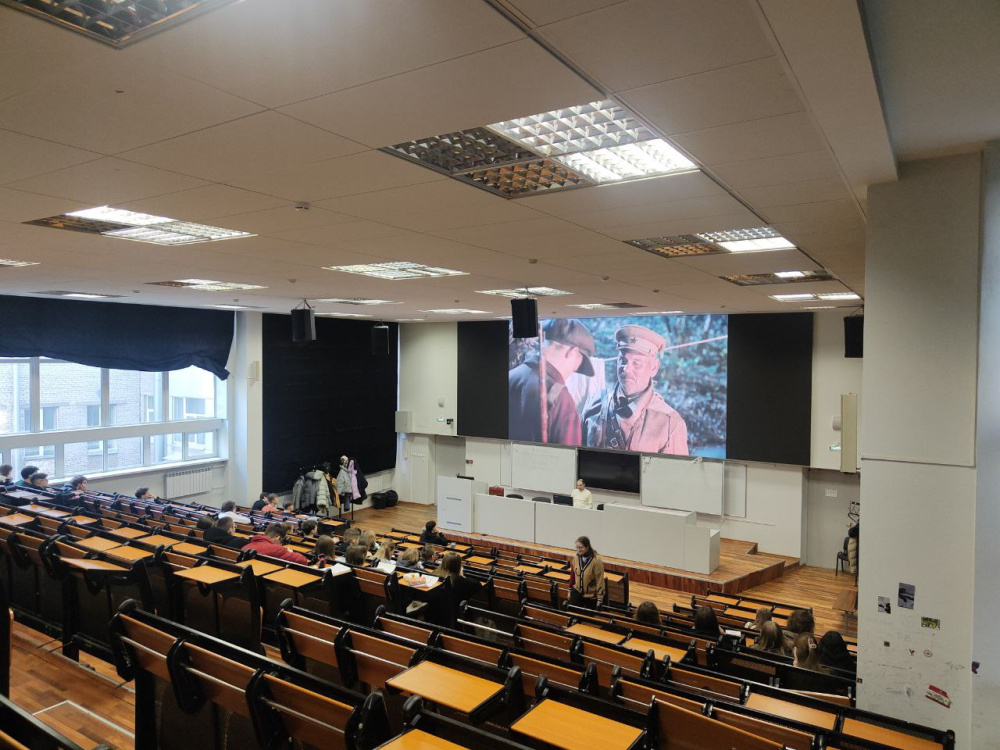
In honor of the eleventh anniversary of the reunification of Crimea with the Russian Federation, which was celebrated on 18 March, and as part of the events to mark the eightieth anniversary of the Victory in the Great Patriotic War, SPbGASU students were shown the film "Children of War. Crimea" (directed by Vera Kilchevskaya), prepared by the Russian Society "Knowledge". The event was organized by the Youth Policy Division.
The film is dedicated to the fates of minors from Crimea who participated in the fight against the Nazi invaders during the Great Patriotic War. Speaking at the screening, Associate Professor at the SPbGASU Department of History and Philosophy, PhD of Historical Sciences Sergey Kargapoltsev emphasized the importance of such events for preserving historical memory and understanding the value of peaceful life.
Associate Professor at the Department of History and Philosophy, PhD of Historical Sciences Evgeny Guryev noted: "The documentary film tells about the fates of real children-residents of Crimea during the Great Patriotic War and their exploits in defending the peninsula. Among the heroes selected by the creators of the film are young men and women, Red Army soldiers and scouts, partisans and underground fighters, representatives of different nationalities. Some of them gave their lives for their homeland, some lived to see the Victory.
The screening of this emotional film in the year of the 80th anniversary of the Victory in the Great Patriotic War is an important event in the field of patriotic education, since it shows, firstly, how terrible the war was and what fate would have threatened the peoples of the Soviet Union if the enemy had not been defeated; secondly, at what price the Victory was achieved, including at the cost of the lives of very young defenders of the Motherland; and, thirdly, that war is hard work and always a moral choice of a person, which encourages him to sacrifice his well-being by going to war, and often his own life. And it is important for the new generation of Russian citizens to know and understand this, since sometimes it is forgotten, which is why such events are held."
Sergey Kargapoltsev also spoke about studying significant events in modern history with students: “These days, during the lecture streams of the discipline “History of Russia,” students learned about the circumstances of the reunification of Crimea with Russia. In the context of this event, the centuries-old ties of Ancient Rus - Russia with Crimea were mentioned, from where Orthodoxy came to the lands of the Old Russian state in 988 (the baptism of Vladimir Svyatoslavich in Chersonesos), and where in 1783 Sevastopol was founded as the main naval base of the Black Sea Fleet of the Russian Empire. The response to the 2014 Nazi coup in Kyiv was the unanimous desire (more than 95% of the votes) of Crimeans, expressed in a legitimate referendum held after the proclamation of independence of the Republic of Crimea, to reunite with Russia in the name of restoring historical justice and civilizational ties, largely interrupted by the transfer of Crimea to the Ukrainian SSR in 1954 and, as a result, its separation from Russia during the collapse of the USSR in December 1991. The heroic defense of Sevastopol from the coalition of Anglo-French-Turkish forces in 1854-1855 and from German-Romanian troops in 1941-1942, as well as the complete liberation of Crimea and Sevastopol from the fascist scum in May 1944, became the series of events in which the events of eleven years ago and their historical significance as the main phenomenon in the modern history of Russia are especially relevant."
According to the students, the film made a strong impression on them.
"The film is interesting from both a historical and artistic point of view. It is very important to remember the events of 1941-1945, so it is necessary to watch films that highlight various aspects of the lives of people who lived through that difficult time," noted Ksenia Zabolotnaya.
"The childhood and youth of the film's heroes coincided with the war years, and circumstances forced them to see the world not through the eyes of a child, to perform a feat that even an adult would not dare to do. Some of the heroes never saw peace in their land. The stories of those who were forced to grow up early made a strong impression," said Viktoria Boytsova.